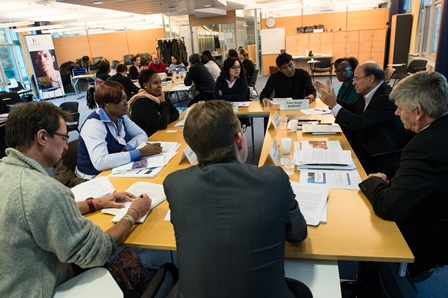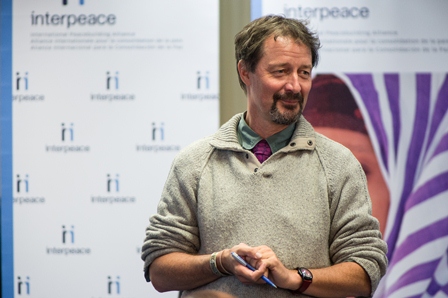Senior Level Peacebuilding Course: Enhancing leadership in peacebuilding

At the beginning of the month, a four-day course on “Enhancing Leadership in Peacebuilding” took place in Geneva. The 23 participants of the course delved into the topic of overcoming leadership challenges in peacebuilding.
The course was organized for the fourth time
Interpeace, in partnership with the Geneva Centre for Security Policy (GCSP), has been organizing this annual course for four years in a row. The course is run on behalf of the Swiss Department of Foreign Affairs (FDFA) and with support of the United Nations Institute for Training and Research (UNITAR).
Exploring leadership in post-conflict contexts
“While extensive knowledge on peacebuilding has been growing, the notion of leadership in post-conflict contexts is still a rather unexplored domain,” explains Koenraad Van Brabant, Head of Reflective Practice and Learning at Interpeace and one of the course directors.
As in previous years, participants were selected to create a balanced mix of people from governmental, multilateral and non-governmental organizations. Some participants had a military background and men and women as well as the Global North and South were evenly represented. Participants came from countries as diverse as Chad, Nigeria, Zambia, Kenya, Egypt, Libya, Tunisia, Nepal and Pakistan.
Understanding leadership, engaging in a process
This course focused on leadership. Designed around four modules, the training methodology was based on three different approaches: a couple of presentations and substantive inputs; peer-to-peer learning; and experiential learning exercises.
The course tried to adapt as much as possible to the needs of the participants. Each participant received individualized feedback on a ‘personality’ and a ‘leadership’ test. Tailored peer guidance on a particular personal experience was another component of the experimental learning sessions. “This course was a great opportunity to engage with senior leaders who have gained substantive insights. The presentations of two leadership experts of from the University of Lausanne and the exercises that followed, provided me with a lot of take-away points,” one participant noted.
 Koenraad van Brabant, Head of Reflcetive Practice and Learning at Interpeace and one of the course directors. Photo credit: Interpeace |
Mentors acted as resource people
During this year’s course, three mentors acted as resource people throughout, sharing their personal experiences: General Robert Gordon, former United Nations Force Commander in the Ethiopian-Eritrean conflict; Caroline Hernandez, Founding President of the Institute of Strategic and Development Studies in the Philippines; Youssuf Mahmoud, former Special Representative of the Secretary General in Burundi, the Central African Republic and Chad; as well as David Atwood, former Director of the Quakers Office to the United Nations in Geneva, joined as fourth mentor for the personal leadership challenge sessions.
Each of the mentors shared two personal leadership challenges they faced in their career and explained to participants how they reflect on them and what they learned. According to Youssouf Mahmoud, “Peacebuilding is a process and there is always a capacity for peace. When dealing with post-conflict societies we need to redefine success and failure: failure is if you don’t even try and success is managing disappointment.”
“Not only did the course allow us to reflect on the concept of leadership in countries such as Chad and the Philippines, but furthermore, it has provided us with a clear understanding of the challenges faced when engaging in communities and with local authorities,” explained another participant.
Inclusiveness as legitimacy
In his session, Scott M. Weber, Director-General of Interpeace, highlighted the importance of inclusiveness in peacebuilding efforts. “For solutions to be sustainable they need to be owned by a cross-section of society. That builds the legitimacy of the solutions.” Understanding who the main actors beyond the “usual suspects” are and engaging in a broad ownership process should be a crucial component of peacebuilding strategies in order to empower key actors as change agents.
Scott emphasized the ‘collaborative leadership model’ in which the leader is mainly a facilitator. “As a leader in the peacebuilding field you have to leave your ego at the door and not care who takes the credit. This creates a sense of ownership among the stakeholders and they will feel like you are working with them rather than for them,” he adds.
